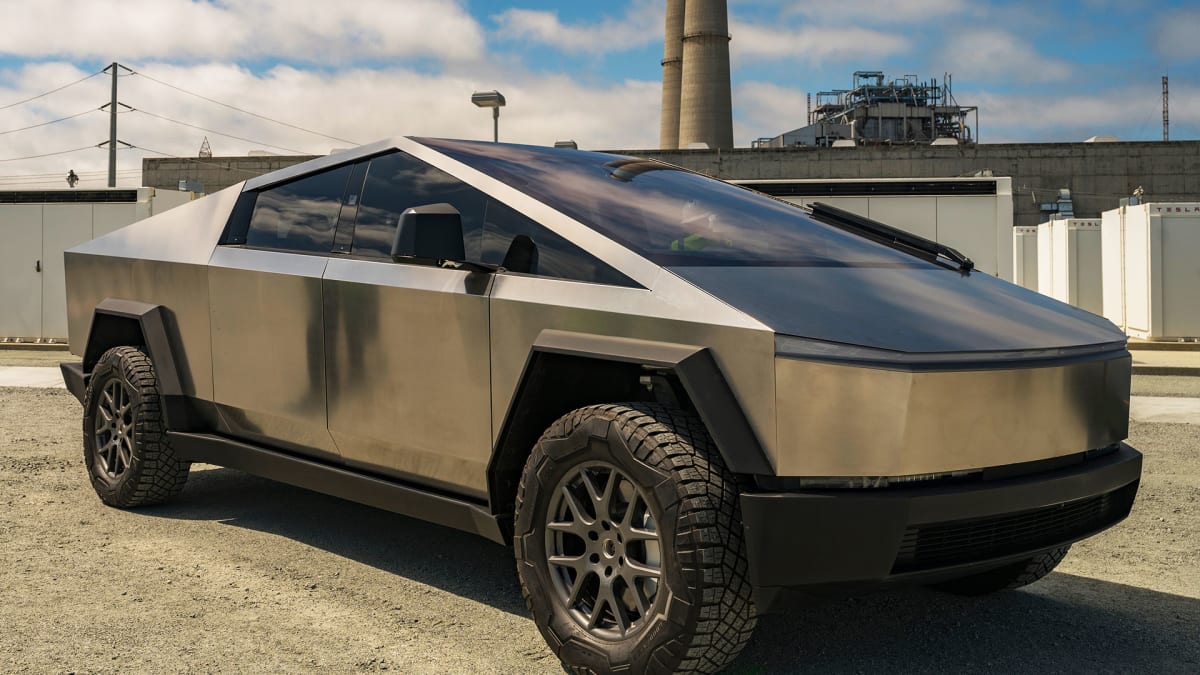
The Cybertruck is once again being talked about.
Tesla's first-ever pickup truck is supposed to revolutionize the way big cars are designed and feel. It will be a game changer, the Austin, Texas-based carmaker has said, and will entice consumers reluctant to pickup trucks to give them a second chance.
"We've pulled people away from their kind of normal comfort zone and brought them something that's just radically different and will be on the street radically different and, you know, if you're not used to attention might be a little tough in the beginning," Franz von Holzhausen, Tesla's Chief Vehicle Designer, said in January.
Elon Musk, Tesla's CEO, first unveiled the electric pickup truck prototype in November 2019, at a promotional event in Los Angeles. The vehicle has been described as something out of the films "Mad Max" and "Blade Runner."
The billionaire himself said that the Cybertruck had been "influenced partly by 'The Spy Who Loved Me,'" in a reference to the amphibious Lotus Esprit S1, featured in the 1977 James Bond film.
Clearly, the goal is to push the envelope, cementing the corporate image of being at the forefront of innovation. Tesla (TSLA) is not like the others: this is the message sent by Musk via the Cybertruck.
Will Tesla Mass-Produce the Cybertruck?
The Cybertruck has become one of the most anticipated vehicles for many decades. It already has legions of fans who rave about every photo or short video depicting the vehicle. Demand is so high, that Tesla no longer takes orders outside North America. The question remains, however, whether the Cybertruck is a vehicle that will be mass produced.
Musk and Tesla answered yes to this question from the onset, by giving a base price of $39,900. In January, Musk indicated that production would start late this year. Production would ramp up from 2024, but the billionaire did not provide any figures.
The vehicle will be produced at Tesla's Austin plant, which has a production capacity of over 250,000 vehicles per year. This site already manufactures the Model Y SUV.
Adam Jonas, Morgan Stanley's star auto analyst, thinks that Tesla could follow the example of Ferrari and "purposely" limit the production of the Cybertruck, to make it a "limited edition."
"The truck is real and we had a great time with it last week behind the Austin plant," Jonas wrote in a research note on Mar. 9. "But financially it may be more of a 'side-show' to the Tesla story today."
To support this statement, Jonas explained that Tesla is no longer the same company as when it unveiled the Cybertruck, just under four years ago. At the time, Tesla's stock price was $22 split-adjusted and the market capitalization was $65 billion, while the company produced five times fewer vehicles than it does today. The company had just turned its first profit.
At the time of writing, Tesla's shares are trading at around $179, while the market value of the company is close to $600 billion. The automaker produced 1.37 million vehicles last year and plans to build 1.8 million units this year. Tesla made more money than Ford and General Motors combined in 2022.
Tesla Doesn't Need the Cybertruck
"The point we are making is that the scale and scope of ambitions for the company has evolved meaningfully since the Cybertruck unveil," Jonas wrote.
Basically, Tesla doesn't really need the Cybertruck anymore, to become a cash machine and compete in the highly profitable and competitive pickup truck segment.
"We believe Tesla has other products under development aimed at the $100bn US pickup truck TAM [Total Addressable Market]. In this current iteration, we do not believe the Cybertruck poses a significant threat to the established pickup truck market, although it could eat into the more enthusiast end of the market (think Ford F-150 Raptor)," said the analyst.
For him, the production volumes won't be high.
"We are prepared for the product to potentially be offered in volumes no more than 100k units/year once ramped up," Jonas predicted. "Our forecast for nearly 500k units of pickup truck volume for Tesla by 2030 includes more conventionally designed variants to hit larger parts of the core pickup truck market including commercial end-user applications (agriculture, building & construction, oil & gas, and other fleet/vocational/recreational uses)."
Jonas takes the opposite view of other analysts and Tesla fans who expect the Cybertruck to become a cash machine for the company and replace current pickup trucks in garages in the heartland of America.
"We understand there may be some readers of this report who may be surprised at the suggestion that Tesla would not try to scale the Cybertruck to as large an audience as possible. Maybe they do, nobody knows for sure," the analyst acknowledged. "We still think the Cybertruck is an important product for Tesla in many ways."
The 'Ultimate Avant-Garde Vehicle'
"The corporate and brand authenticity is enhanced by bringing ‘statement’ products like Cybertruck to market that capture the imagination of consumers. Playfulness and iconoclasm is part of the Tesla brand," Jonas continued.
But he believes that Tesla’s mission and the expectations embedded in its huge market capitalization have expanded exponentially since 2019.
Calling the Cybertruck the "ultimate avant-garde vehicle," Jonas said it will more likely be an "enthusiast/cult car with far more limited volume (closer to 50k units/year) with some design and manufacturing learnings that could ultimately migrate to the rest of Tesla’s core lineup."
"We feel the Cybertruck carries more value in a cultural/zeitgeist sense than in a direct economic sense. At the same time, we encourage our readers to ask themselves:how many Cybertrucks can roll up to a parent-teacher conference or youth soccer match at the same time before losing some of that indescribable... something?"
Tesla, which no longer has a communications department, did not immediately respond to a request for comment.







